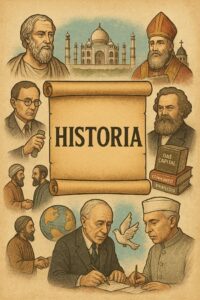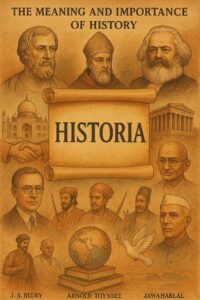1st PUC History Question and Answer – Introduction of History
Looking for 1st PUC History textbook answers? You can download Chapter 1: Introduction of History Questions and Answers PDF, Notes, and Summary here. 1st PUC History solutions follow the Karnataka State Board Syllabus, making it easier for students to revise and score higher in exams.
Karnataka 1st PUC History Textbook Answers—Reflections Chapter 1
Introduction of History Questions and Answers, Notes, and Summary
1st PUC History Chapter 1
Introduction of History
Scroll Down to Download Introduction of History PDF
I. Answer in one word or one sentence
Question 1.
What is the meaning of the word ‘Historia’?
Answer:
Enquiry or Investigation.
Question 2.
From which language is the term ‘Historia’ derived?
Answer:
The term ‘History’ has been derived from the Greek word ‘Historia’, which means ‘Enquiry’ or Investigation.
Question 3.
Who is called as ‘the Father of History’?
Answer:
Herodotus.
Question 4.
To which country did Herodotus belong?
Answer:
Greece.
Question 5.
Mention the work of Herodotus.
Answer:
The History of Persian Wars.
Question 6.
Who wrote the book ‘The City of God’?
Answer:
St. Augustine.
Question 7.
Who gave the economic interpretation of history?
Answer:
Karl Marx.
Question 8.
Write the definition of history by Karl Marx.
Answer:
“History is a story of the struggle between the haves and have nots.”
Question 9.
What is J.B. Burry’s definition about history?
Answer:
“History is a science; no less and no more.”
Question 10.
Mention the book of Arnold Toynbee.
Answer:
A Study of History.
Question 11.
Who defined History as ‘The rise and fall of civilization’?
Answer:
Arnold Toynbee.
Question 12.
What is the definition of Jawaharlal Nehru about history?
Answer:
“History is a story of man from barbarism to civilization.”
II. Answer in 2 words or 2 sentences each
Question 1.
Mention any two definitions of history.
Answer:
- Herodotus: “History is a record of great heroes and unique events to be remembered by the future generations.”
- Karl Marx: “History is a story of the struggle between the haves and have nots.”
Question 2.
Name the works of Karl Marx.
Answer:
Das Capital and Communist Manifesto.
Question 3.
Which are the two important works of Jawaharlal Nehru?
Answer:
Discovery of India and The Glimpses of World History.
Question 4.
Mention any two professional uses of history.
Answer:
- Useful for competitive exams like IAS, IPS, IFS, KAS.
- Career opportunities in museums, archives, tourism, and archaeology.
III. Answer in 15 to 20 sentences: (Each carries 5 Marks)
Question 1.
Write the definitions of history ?
Answer:
History is one of the greatest branches of human knowledge. The term history comes from the Greek word Historia, meaning enquiry or investigation. The Sanskrit word Itihasa means definite events that have occurred. Different scholars have given different definitions of history.
- Herodotus defined history as “a record of great heroes and unique events to be remembered by the future generations.”
- Augustine saw history as “the story of the struggle between God and Satan, ending in the victory of God over evil.”
- Karl Marx defined history as “the story of the struggle between the haves and have nots.”
- B. Bury said, “History is a science; no less and no more,” meaning it should be based on evidence and critical study.
- Arnold Toynbee defined history as “the story of the rise and fall of civilizations.”
- Jawaharlal Nehru viewed history as “the story of man from barbarism to civilization.”
From these definitions, it is clear that history deals mainly with human activities, achievements, and struggles over time. It is the narrative of past events, restricted to a particular time and place, guiding mankind toward the right path.
Question 2.
Explain the importance of study of history
Answer:
Importance of Studying History
- History Memory of Past Events
History records major events, great personalities, and human struggles. Will Durant said, “A country’s past is like an individual’s memory—without it, sanity goes.” It develops awareness and intellect. - History Religious Tolerance
History teaches harmony between different faiths, as preached by Jesus, Kabir, Guru Nanak, Sufi saints, and others. Arnold Toynbee called India’s tolerance vital for mankind’s survival. - History Source of Inspiration
Lives of Mahaveera, Buddha, Vivekananda, Lincoln, Mandela, and others inspire ideals, courage, and service. Carlyle said history keeps great personalities alive through records. - History Promotes Patriotism
Knowledge of heritage and freedom fighters like Shivaji, Rani Lakshmi Bai, and Bose fosters national pride and unity. - History Laboratory of Social Sciences
History provides data for economics, sociology, geography, and politics. Even UNO resolutions rely on historical lessons. - History Infuses Noble Ideals
Teaches values like liberty, equality, truth, non-violence, and service through examples of Ashoka, Christ, Prophet Muhammad, Ambedkar, and Mother Teresa. - History Broadens Outlook
Gives knowledge of global traditions, customs, art, literature, and religion, expanding one’s horizon. - History Promotes International Peace
Lessons from world wars show the need for cooperation and avoiding narrow nationalism. History supports bodies like the UNO in peace efforts. - History Professional Uses
Useful for civil service exams and careers in archaeology, museums, archives, tourism, journalism, teaching, and administration. - History Removes Prejudices
Helps overcome caste, creed, language, and race biases, promoting peace, friendship, and global understanding.
Additional Question and Answer:
I. One Mark (One word/One sentence)
Question 1.
Who is regarded as the “Father of History”?
Answer:
Herodotus.
Question 2.
Who wrote ‘The Discovery of India’?
Answer:
Jawaharlal Nehru.
Question 3.
Which historian studied 26 civilizations of the world?
Answer:
Arnold Toynbee.
Question 4.
Name the book written by St. Augustine.
Answer:
The City of God.
Question 5.
Who said, “History is a science; no less and no more”?
Answer:
J.B. Bury.
II. Two Marks (Two words/Two sentences)
Question 1.
Mention two noble ideals promoted by history.
Answer:
Liberty and Equality.
Question 2.
Give two examples of monuments that represent cultural heritage.
Answer:
Taj Mahal and Greek Parthenon.
Question 3.
Name two personalities who inspired patriotism through history.
Answer:
Subhas Chandra Bose and Rani Lakshmi Bai.
III. Five Marks (Brief Answer):
Question 1.
What professional opportunities are available for students of history?
Answer:
Students of history have career opportunities in teaching, archaeology, museums, archives, tourism, journalism, and civil services like IAS, IPS, IFS, and KAS. Professional historians work in the Archaeological Survey of India and state archaeology departments, where they conduct excavations, preserve antiquities, and research historical events. Historical knowledge is also useful for politicians, lawyers, and administrators in decision-making and policy implementation.


